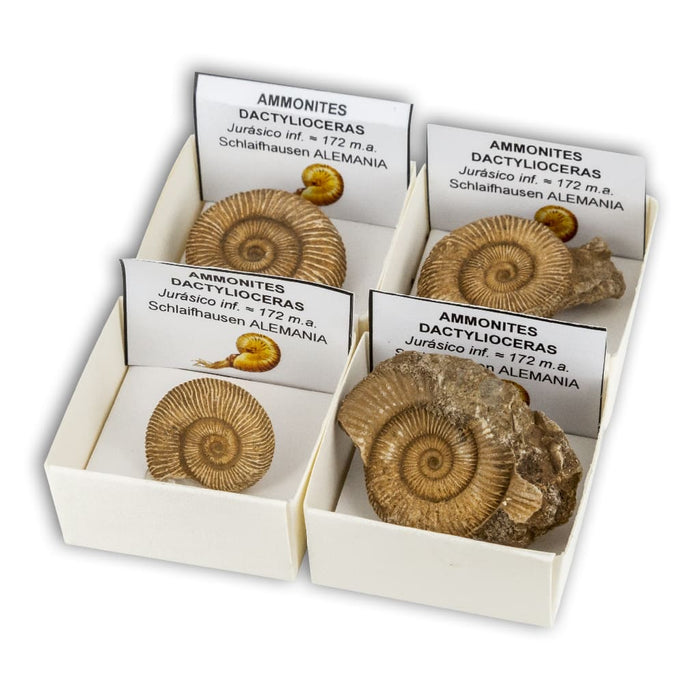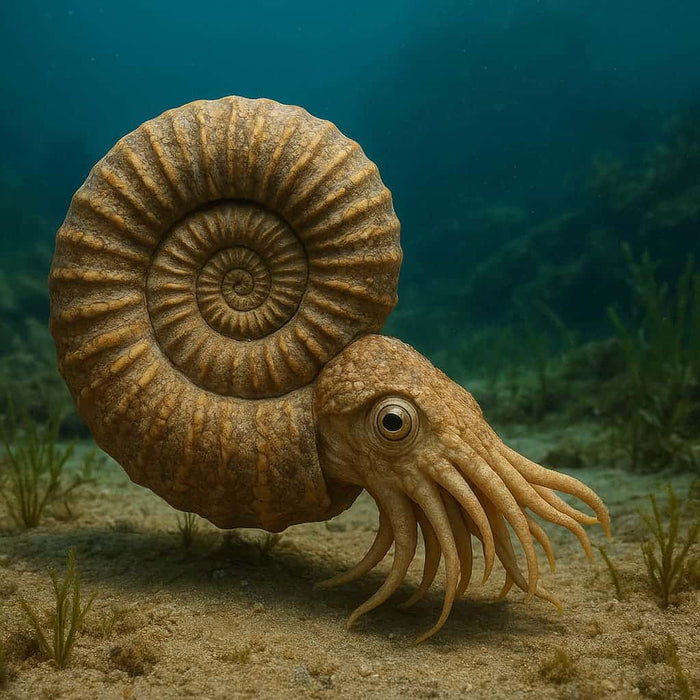
Dactylioceras Ammonites in Collection Box 4x4 cm
Devoluciones fáciles
Tienes hasta 30 días para cambiar o devolver los productos
|
Species |
Ammonites Dactylioceras |
|
Geological Period |
Lower Jurassic ≈ 172 ma |
|
Origin |
Schlaifhausen, Germany |
|
Size |
2.0 - 3.0cm |
Ammonites Dactylioceras.
Like many other ammonites, Dactylioceras is an index fossil to identify the Jurassic region.
Its collective name refers to its resemblance to the spiral horns of a ram, with which the Egyptian god Amun was depicted in his Roman adaptation (Jupiter-Amun).
The Ammonites were a group of cephalopods with a spiral shell, which thrived in the Mesozoic oceans, and abruptly went extinct along with the dinosaurs.
The group, numbering some 10,000 species, disappeared 65 million years ago, providing uncompromising support for biological evolution and evidence for our planet's changing biodiversity.
Deposits : Europe, although the best specimens are from England and Germany.
The fossil includes a label with the name, period and provenance and is attached to a 4 cm square cardboard box.
*The price is per unit (a single cardboard box of the four shown in the photo)
Since the samples are natural, you will receive a piece similar to the one in the photograph. The fossils come in cardboard boxes and are glued to a porex base with hot silicone; these can be removed using ethyl alcohol without damaging the fossil. The size is approximate.
Envíos y Devoluciones
Existen 2 tarifas de envíos en función de la zona y el tiempo de entrega:
ESTÁNDAR | 24H - España peninsular
BALEARES | 48-72H - Islas Baleares
*Para Portugal hay opción de envío en 24 horas y este nunca será gratuito.
*En el caso de las Islas Baleares, es necesario elegir el método de envío especial de Islas Baleares y este nunca será gratuito.
*No se realizan envíos a las Islas Canarias, Ceuta y Melilla.
Envio Gratis en pedidos superiores a 50€. Envios en 24H
ENVIOS PARA EUROPA
Se realizan envíos a:
Bélgica, Francia, Alemania e Italia con un periodo de entrega de 4 a 10 días hábiles.
Estos envíos nunca serán gratuitos y se calculará la tarifa en el momento de introducir la dirección en la pantalla de pago.
PARA VER MÁS INFORMACIÓN PINCHA AQUI
Los pedidos realizados antes de las 12:00 horas serán enviados en el día, después de esa hora pasarán a ser enviados al día siguiente.
Los fines de semana no se hacen entregas. Todos los pedidos realizados durante el fin de semana o festivo pasarán a ser gestionados el lunes o el día siguiente laboral.
Ten en cuenta que en épocas de rebajas o navidad, nuestros tiempos de envios pueden verse afectados debido al gran volumen de trabajo soportado.
DEVOLUCIONES
Devolución dentro de 30 días naturales a partir de la recepción del paquete, siempre y cuando se respete el embalaje original y no haya daños en la pieza. Para más información, consulta nuestra Política de Devoluciones
Guía de Tamaños
¿Tienes dudas sobre los tamaños de las muestras? Mira nuestra guía de tamaños

